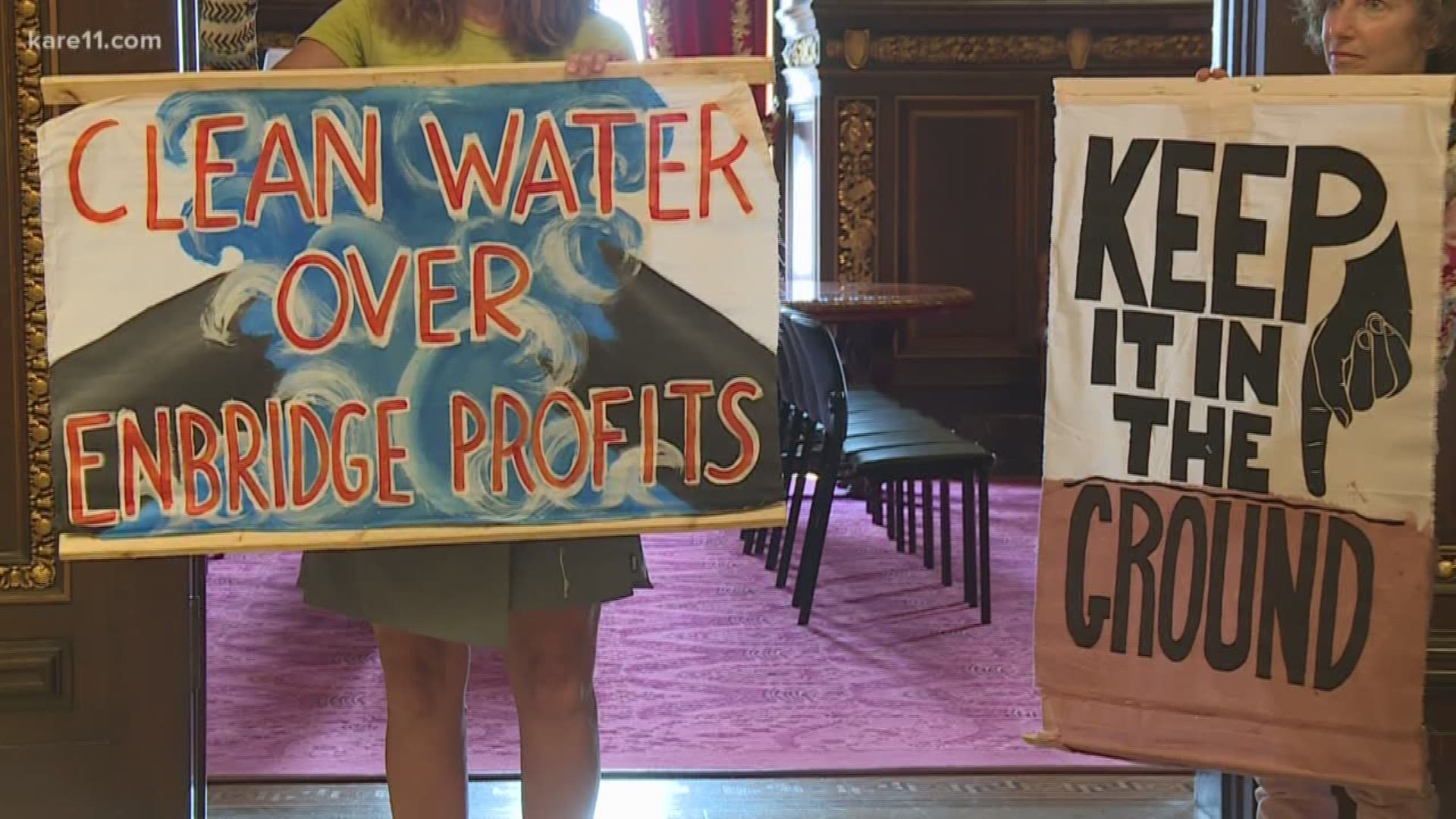ST. PAUL - Environmentalists and Native American groups once again protested the Line 3 oil pipeline project in the streets of Bemidji on Wednesday afternoon, continuing their objection to Enbridge Energy's plan for a $2.6 billion replacement through northern Minnesota.
But this time, thanks to live streaming technology, their message was carried all the way to the halls of the Minnesota State Capitol and the office of Gov. Mark Dayton.
With tablets in hand, a small group of activists crowded the governor's waiting area on the first floor, blaring the live broadcast from Bemidji toward a staffer and a capitol security guard as a symbol of their opposition to the project.
These opponents remain concerned about Enbridge's long-term investment in fossil fuels, which they say will only accelerate climate change. They also worry about potential oil spills, which they say would threaten ceremonial land for Native American tribes and pose risks to their food and water sources.
"We're here to call on Dayton to use the power that he has," Frances Wetherall said as she stood near his office, "to stop Line 3."
However, it's unlikely this issue will be resolved by the time Gov. Dayton leaves his post.
And the fate of Line 3 hardly rests with his office alone.
Dayton, who is not seeking re-election in November and was not in his office on Wednesday, has pointed out that Enbridge still needs 29 permits approved by local, state and federal government agencies in order to move forward with the pipeline replacement project.
Enbridge did score a major victory earlier this summer when the state's Public Utilities Commission granted it a certificate of need for the project, but it cannot start construction until the other permits have been issued.
Enbridge has long maintained that the current pipeline is aging and needs to be replaced, so if it receives necessary approvals, the company would like to begin work on the Minnesota portion in early 2019. Other parts of the Line 3 pipeline in Wisconsin and Canada have already been replaced over the past year, after local governments issued permits in those regions.
The company predicts the Line 3 replacement project — which in Minnesota is a larger construction project than even U.S. Bank Stadium was — will create more than 8,000 jobs.
"And that'll put lots of people to work," Enbridge Line 3 project director Paul Eberth told KARE 11 in June. "And it'll also have spin-off effects to restaurants, hotels and people working in the area."
Opponents to the project say the economic benefits are not worth the risks to the environment, evidenced by a demonstrator's sign in Dayton's office that said "Clean Water Over Enbridge Profits."
Wetherall, a member of the Youth Climate Interveners, said the possible effects on wild rice crops are particularly concerning.
"Wild rice is absolutely put at risk. WIld rice is already endangered and it's one of the greatest cultural resources that we have here in Minnesota," she said. "And it's absolutely important to many tribes here in Minnesota."
The demonstrations in Bemidji and St. Paul on Wednesday were hardly the first protests against Line 3 replacement. They have intensified this summer, particularly after state regulators approved the certificate of need.
The Public Utilities Commission also approved a preferred route for the replacement project, but negotiations over the exact path continue with the Fond du Lac band. These discussions center around whether the pipeline should cross reservation land. The deadline for the route decision is Aug. 31.
In response to the two protests on Wednesday, Enbridge released a statement to KARE 11 affirming the demonstrators' right to protest.
"We respect people's right to express their views safely and in accordance with the law. It's important to know that the groups protesting have, in many cases, participated in Minnesota's very robust regulatory review process for the Line 3 Replacement Project," the company said in the statement. "Replacing Line 3 is about safety, first and foremost. The best way to protect Minnesota's environment and ensure we get the energy we use in the State is to replace Line 3. The Public Utilities Commission recognized this when they voted unanimously to grant the Project a Certificate of Need."
Gov. Dayton did not respond directly to the protest at the capitol, but his office pointed KARE 11 to a previous statement he issued in June after regulators issued the certificate of need.
"Those regulatory reviews, which address numerous issues not considered by the PUC, will take several months," the governor said at the time. "Approvals are by no means assured, and they would require any such project to meet Minnesota's highest standards, protecting all our state's earth, air, water, natural resources, and cultural heritage."

